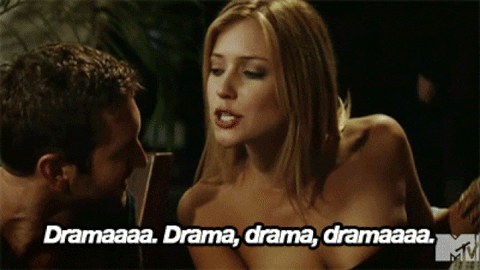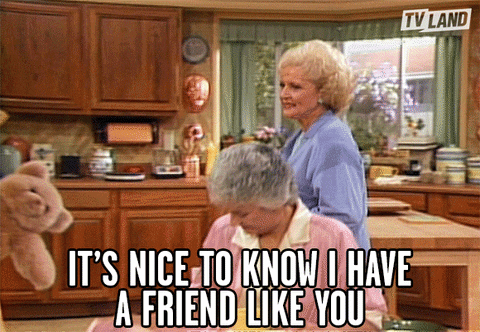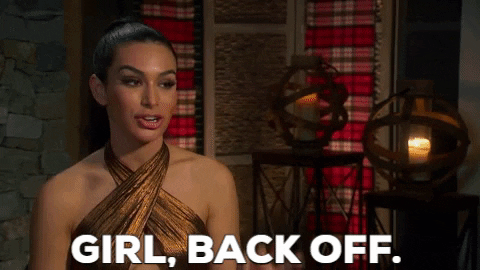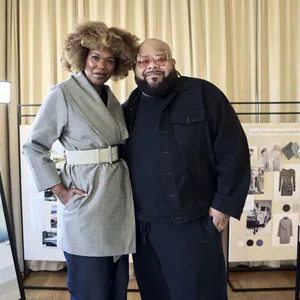I've been writing, pretty consistently, for xoNecole for about a year now. And if there's one thing that I know is you, our readers, really appreciate, it's sex and friendship content (which I think is really dope, by the way). My theory is it's because those are two topics, especially within the Black female community, that don't get explored, from various angles, nearly as much as we'd like for them to. Because of that, some of us remain curious, confused, stagnant or dissatisfied, in those two lanes, far longer than we should.
Take the topic of frenemies, for instance. As much as I can, I like to give credit where credit is due, and I think that term came from—or has at least became super popular because of—an episode of Sex & the City. If you've never seen it or want a quick refresher course, a frenemy is someone who is part friend/part enemy (although it's usually more like a 60/40 split, in the enemy's favor). You have enough in common with the frenemy to keep them around, but they also irritate you to the point where you're not sure if your connection is enough to keep them in your world anymore. They're basically like an unhealthy relationship with a guy where, maybe the sex is good, but there isn't much more to keep him in your life beyond than that. Still, you stay—even though, deep down, you know that you shouldn't.
If you just read all of that and was like, "Right!" let this be the moment when you decide to make some changes, as far as your own frenemy (or frenemies) is concerned. Life is too short and too precious for you to be involved with folks who are only kinda-sorta your friend; especially if you can clearly pinpoint some things about them that can also classify them as being an enemy.
Keeping all of this in mind, just why do so many of us keep frenemies around? Personally, I think it's because we don't do enough pondering over the following five points.
FRENEMY POINT #1: There’s a Difference Between Liking Someone and Being Used to Them

If any of y'all caught "What If You Love Your Friend...But Don't Like Her Anymore?" I'm sure you can totally relate to this particular point. I can't tell you how many friendships—or "friendships"—that I remained in, way past their expiration date, and it was all because I confused actually liking someone for simply being used to them being around me. Shoot, there's absolutely no tellin' how many captives could be freed if they took the time to ask themselves, "Is this person good for me? Or are they just a habit?"
There's one person, in particular, who I released last year, mostly because I found myself complaining about them to other people more and more. One day, it got to the point where I was tired of hearing my own self go on and on about how I felt taken for granted and doing most of the work. Then I realized that the only real reason why I was keeping them in my life is because they had been around for so long. When I couldn't really find one redeeming quality beyond that, I knew it was time for a major shift.
Frenemies are interesting because, more times than not, they are fully aware of the fact that they aren't being a good friend to you. But, like a wack-ass boyfriend, they figure that since you are willing to settle, they're not going to change anything; especially since they typically are still benefiting from having you in their own life (I know, right)? So yeah, if you sense that you've got a frenemy, the first thing I think you should do is ask yourself what, if anything, you still like about them. If all you hear is Jeopardy music playing in your head, follow that question up with, "Or is it that I'm just used to them?" The clarity you get just might surprise you.
FRENEMY POINT #2: Have You Considered That You’re Possibly Drawn to Drama?

Even if the frenemy isn't a drama queen or king (which, they probably are to some extent), when a relationship consists of a part-friend/part-enemy dynamic, there is usually some drama somewhere around. Think about it. Frenemies typically push triggers or are master gas lighters. Frenemies often display low-key (or not-so-low-key) signs of envy. Frenemies tend to take more than they give. Frenemies are wishy-washy AF. Frenemies are good for being passive aggressive, including when it comes to giving backhanded compliments or saying slick stuff that causes you to doubt yourself. Frenemies like to throw shade—both in and out of your presence. And, even if they are a lot of fun, you can never feel totally safe around frenemies.
Once I started to remove frenemies from my space, I found myself focusing more on why I stayed than why they acted the way that they did. I had to own that some of it was because I was more codependent than I realized. Another part of the issue is that I was my own freakin' frenemy.
Meaning, since I didn't love myself well, I attracted people into my space who basically mirrored my own self-perception. The warring within caused so much turmoil that the drama they brought into my life was pretty much par for the course. But baby, once I started to make peace with myself and began to set some real boundaries, the less I wanted anything that even closely resembled drama or instability around.
If you've got frenemies in your life, ask yourself if you have some sort of odd affinity for drama—if you seem to take some odd sense of pleasure in partaking in a real-life reality show that you're actually a producer of. I'm telling you—the more you like harmony, the less you'll want to deal with confusion, upsets and upheaval, the easier it will be to let all frenemies go.
FRENEMY POINT #3: Like It or Not, There Is Some Sort of Payoff in the So-Called Friendship

I've shared what I am about to say, many times, before. That's because it's one of the best things that I've ever heard Dr. Phil say. One time, while interviewing a prostitute who was going on and on about how much she hated her life, he looked at her with some major side-eye and said (a bit paraphrased), "C'mon. If you really wanted to quit, you'd quit. No matter how dysfunctional something is, we wouldn't stay in it if there wasn't some sort of payoff attached to it."
Some of y'all might automatically want to give pushback on his point, but just think about it. Some of us stay in unhealthy relationships because the sex is good. Some of us remain at a job where our boss treats us like total crap because we don't wanna lose that nice paycheck. And yes, some of us stay in connection with our frenemies because we see some "benefits" to keeping them in our lives. Maybe we've got a lot in common with them. Perhaps they make us feel needed (and we like feeling that way). The possibilities are endless. Here's the thing, though. No person is perfect and every relationship comes with its challenges. But if you want to be in something that is truly beneficial for you, the "pros" must definitely need to outweigh the "cons".
When it comes to your frenemy, is the so-called good that they bring to your life so good that it makes sense to keep tolerating the bad? If you can't honestly say so…it really is time to let them go.
FRENEMY POINT #4: Could It Be That You Don’t Have Enough Healthy Friends?

If you like to check out independent Black films, one that depicts a frenemy extremely well is Love Trap. The chick Angel that's in it? Whew. Evil. Still, she would come at her childhood friend like she only had the best of intentions. I believe there is a scene in the movie where Michelle addresses the fact that a part of what made her put up with all of Angel's hater-rade is the fact that she had been in her life for so long. But since Michelle also shared some of the issues that caused her to struggle with vulnerability and trusting new people, I think that she never really had enough healthy friends to realize just how toxic Angel really and truly was.
If you just read that and found yourself triggered, please make the time to read "10 Things You Should Absolutely Expect From Your Friendships". Then think long and hard about if your frenemy even checks off half of the things on the list. Also ask yourself if you've currently got people in your life who do. One of the tricky things about a frenemy is they don't totally suck; there are usually a few things that make them cool enough to keep around. But I promise you, the moment that I got some truly healthy friendships into my life, I realized that there was nothing that my frenemies were bringing to the table that my true friends couldn't.
FRENEMY POINT #5: Ask Yourself this—“What’s Your Line?”

Whenever I'm talking to someone about a situation that they're in where they are unhappy, I try and avoid going down the rabbit hole of what I would do. Instead, I simply ask them one question—what's your line? What I mean by that is "What's your boundary that, if that person crosses it, you're done?"
Truth is, a lot of us remain in all sorts of situations that we shouldn't, not because we want to, but because we've never thought about what our breaking point is (or should be). The reason why you should is because healthy relationships consist of mutual respect. So, once you share your "line" and your frenemy intentionally crosses it, they are basically conveying to you that they don't esteem your boundaries, needs or feelings. And once someone expresses that—sorry. They've basically teetered off of the friend mark and over onto the enemy side.
Releasing someone you care about can be difficult. Trust me, I know. But here's what you need to never forget—you need to be your own friend, even if it's at the expense of losing a frenemy. It might take a little time, but you'll both be OK without each other. You can free up some space for real friends and they can move on to being wishy-washy towards someone else. And chile, they most definitely will.
Want more stories like this? Sign up for our newsletter here and check out the related reads below:
Allow These Things To Happen Before Calling Someone "Friend"
Pettiness, Moodiness & Other "Friendship Irritants" To Work Through
10 Questions To Ask Your Close Friends Before The New Year Begins
Is It Time To Initiate A 'Friend Divorce'?
Feature image by Giphy



























